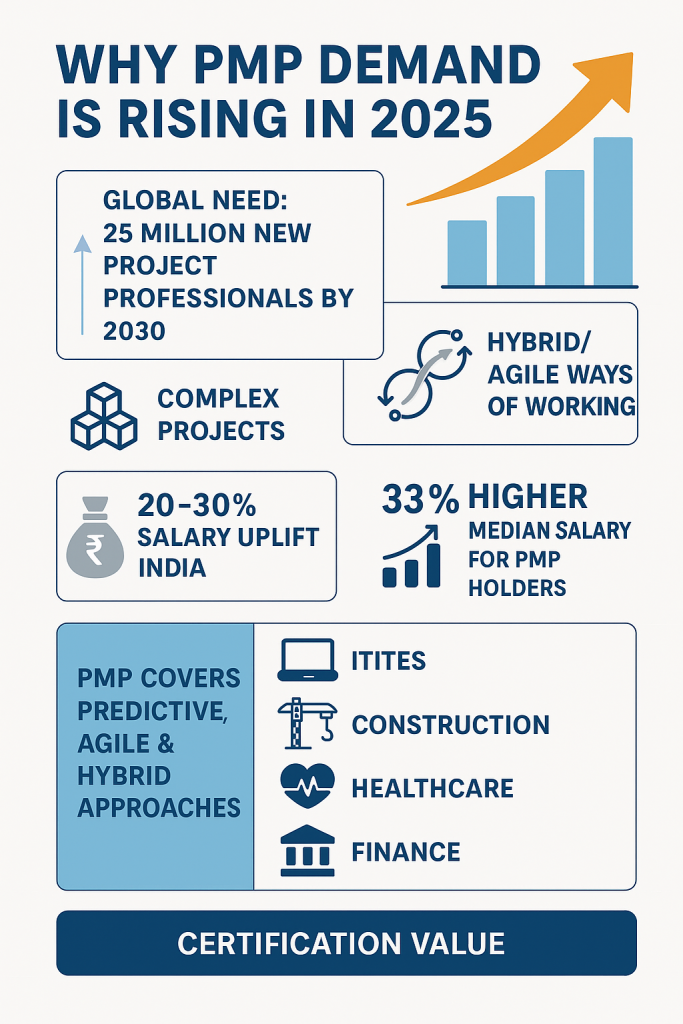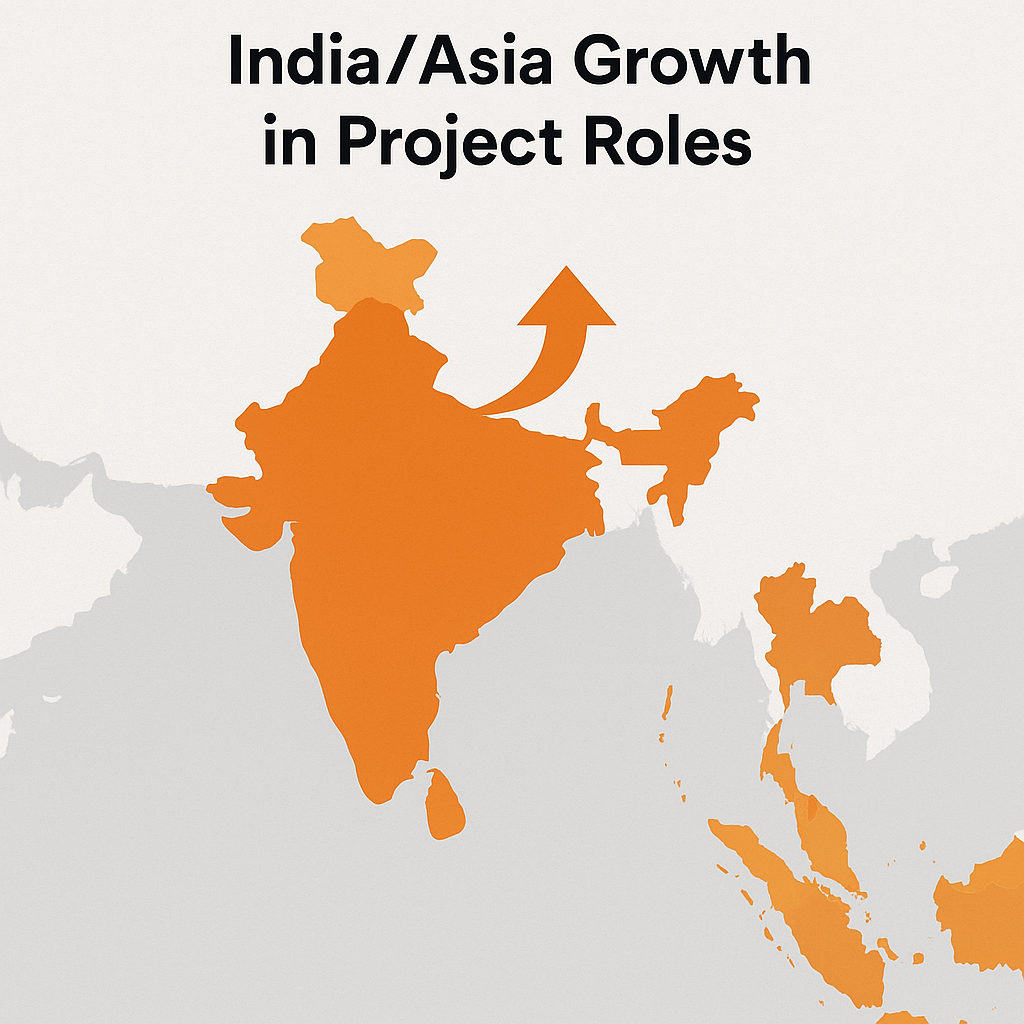Table of Contents
ToggleIn today’s dynamic business and digital landscape, projects are no longer simple one-off efforts. They are complex, global, cross-functional and require agile responses. As a result, the demand for certified project-leaders is rising — and the PMP (Project Management Professional) certification by Project Management Institute (PMI ®) has emerged as a trusted benchmark.
PMI describes the PMP as a certification that “proves you have the project leadership and expertise in any way of working: predictive, hybrid or agile.” Project Management Institute+2PMI India+2 Industry analyses forecast that the demand for PMP-certified professionals will remain strong — especially in India and Asia where digital transformation, infrastructure growth, healthcare and IT continue to drive project volumes. Institute of Project Management+3iCert Global+3@knowledgehut+3
For professionals in Bengaluru, India, this means the time is ripe to invest in a PMP credential — and for corporate L&D providers like Spoclearn, it’s a compelling market-positioning opportunity.

Why the Demand is Strong & Sustained
1. Projects are getting more complex
Organisations today operate across geographies, with remote teams, multiple stakeholders, regulatory demands, and technology shifts. According to Simplilearn, “the global demand for skilled project managers is robust across industries” as project complexity and scale grow. Simplilearn.com
Similarly, the IPM Quarterly report states:
“As 2025 unfolds, the demand for project management jobs is steadily climbing.” Institute of Project Management
This creates clear need for professionals who not only manage tasks but can lead outcomes in uncertain environments.
2. Global recognition + market credibility
PMP is accepted in over 200 countries and models for all types of ways of working: traditional (predictive), agile or hybrid. monday.com+1
In India, for example, PMI’s site notes that there are more than 1 000 000 PMP holders globally and the credential delivers a “competitive edge” by validating people-skills, process-skills, and business-environment awareness. PMI India
From the employer side: companies favour hiring PMP-certified professionals because it “instils confidence”, gives “international recognition”, can be a requirement in regulated sectors, and helps mitigate risk. projectmanagementacademy.net
3. Higher salary, better career mobility
In India, a recent KnowledgeHut article highlights that PMP-certified professionals are in “high demand across leading Indian and multinational companies” and earn 20–30 % higher salary compared to non-certified peers. @knowledgehut
Globally, PMI reports that PMP certification holders report 33% higher median salaries on average across 21 countries surveyed. Project Management Institute
This means the investment in PMP is yielding tangible ROI for many professionals.
4. India & Asia-Pacific are growth markets
India’s large IT-services industry, infrastructure growth, healthcare expansion and global delivery models create many project-led opportunities. The KnowledgeHut blog states:
“In India … certified project managers are in demand across IT, construction, healthcare, and finance.” @knowledgehut
As organisations increasingly adopt global sourcing, cross-border projects and digital transformations, the need for credentialed, versatile project leaders rises.

5. It fits today’s hybrid/Agile world
The PMP certification now explicitly covers “predictive, agile and hybrid approaches.” Project Management Institute
So, professionals who learn through a PMP training programme know that their credential is aligned with how modern organisations actually run projects — not just old-school Waterfall.
What This Means for You (Professional)
As a professional in Bengaluru or India, here’s how you can leverage this trend:
- Boost your credibility: If you list “PMP certified” on your profile, it signals you possess leadership, process, and business-outcome capabilities, not just task-execution.
- Open more roles: Because demand is rising across industries (IT, infrastructure, manufacturing, healthcare), you widen your job-market reach.
- Increase earnings: With salary uplift and better job positioning, you enhance your return on investment.
- Global mobility: With PMP recognised worldwide, you become eligible for roles that cross geographies, especially as organisations outsource or operate globally.
- Stay future-proof: Since the credential emphasises agile/hybrid approaches and modern project leadership, you’re better positioned for evolving project-landscapes.
What It Means for Your Organisation / Training Provider
For Spoclearn – as a corporate L&D & training partner – here’s a strategic take-away:
- Position your PMP offering as “Supply meets Demand”: With the market wanting more qualified project leaders, you’re offering the solution.
- Target sectors of growth: In India, focus on IT/ITES, infrastructure, healthcare, BFSI and manufacturing – all showing rising project intensity.
- Localise your messaging for Bengaluru/India: Use salary uplift data local to India, highlight demand in Indian markets, reference global mobility from India.
- Promote the hybrid/Agile-aligned version of PMP: Emphasise that the version of PMP you train covers predictive + agile + hybrid ways of working (which is exactly what PMI states).
- Create an ROI story for corporates: For enterprise clients, talk about risk mitigation, certification credibility, more reliable project outcomes, better internal brand of project-management discipline.
Conclusion
As we head further into 2026, the message is clear: the demand for PMP-certified project professionals is strong and sustained. For professionals in India — especially Bengaluru’s tech and services ecosystem — earning the PMP credential is a strategic move that aligns with market demand, salary uplift, global mobility and relevance in hybrid/Agile ways of working.
For organisations and training providers like Spoclearn, this trend offers a compelling positioning: delivering the right credential when the market is actively looking for it.
If you are ready to advance your project-leadership career — or build your corporate team’s credentials — now is the time.
